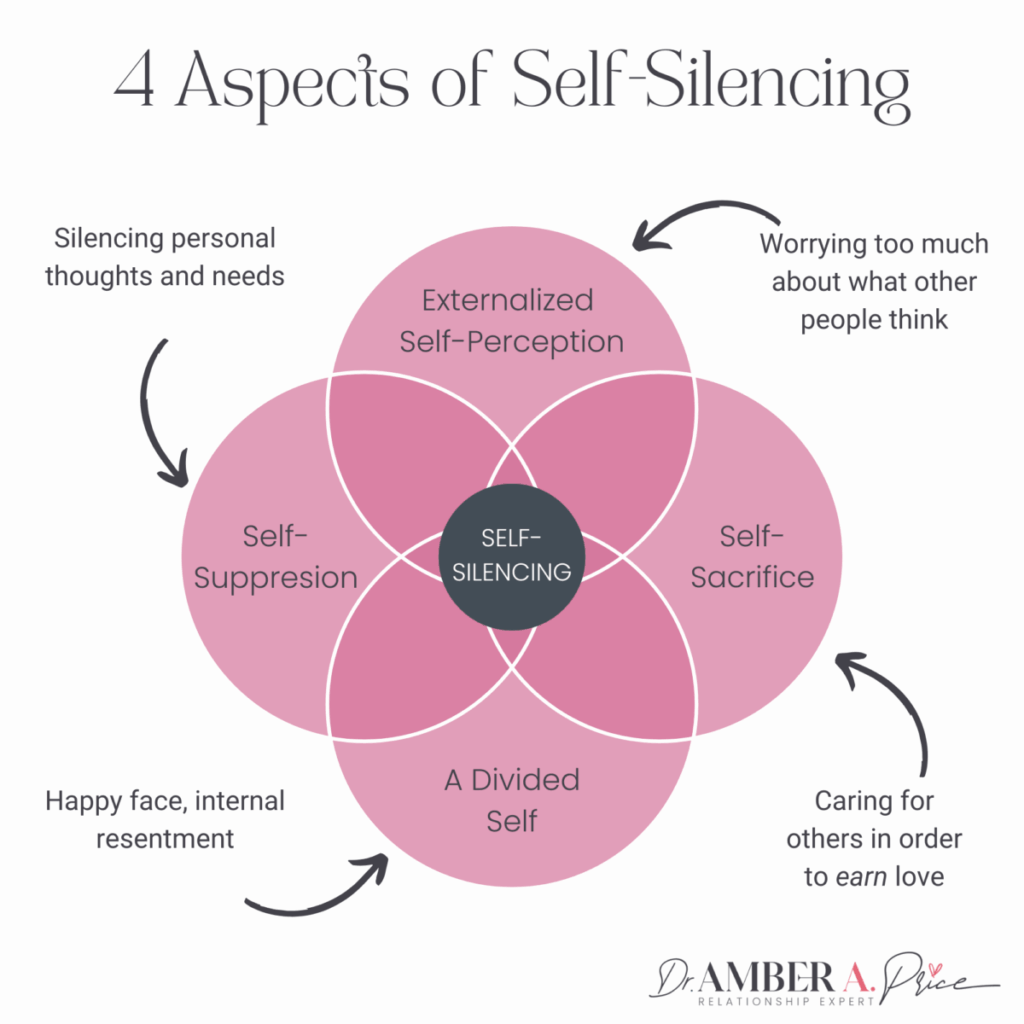Summary: Psychologists call it self-silencing: suppressing your thoughts, feelings, or desires to maintain approval or harmony. It’s one of the most common — and most invisible — ways women lose connection to themselves and others. In this guide, you’ll learn the four patterns of self-silencing and discover small, doable steps to start reversing them.
I think most of us probably have at least an inkling about what it means to self-silence—even if we’ve just heard the word for the first time.
It is what it sounds like—suppressing yourself, your own thoughts, feelings, ideas, or desires so that other people will like you or so that you can preserve a relationship.
We do this because we want other people to like us. I mean, what’s wrong with that?
This gets tricky though because these self-silencing behaviors end up hurting the very relationships we are hoping to create or maintain.
That’s because it’s crucial to a relationship that you actually show up. You can’t connect with someone who isn’t really there.
But what does self-silencing actually look like in real, lived experience? And how do you know if you’re doing it?
Self-silencing can be broken down into four interrelated areas. If you’re doing one, you’re probably doing them all. (Though one area might be showing up more for you than others. Want to find out which is strongest for you? Take this free quiz.)

And if you’re doing it, you’re not a totally flawed human. You’re like most of us—just trying to survive and feel connected in a world that’s making it hard.
So here’s a quick breakdown of what each aspect of self-silencing looks like in real life:
Externalized Self-Perception (The Approval Seeker)
Is it just me or are there a million voices out with ideas about how you should be living?
It seems like everyone has an opinion on what you should be eating, how much you should get done in a day, what activities your kids should be in, how much you should weigh, how much is too much screen time, how you should be voting, and the list goes on and on…
It’s HARD not to get swept up in trying to live up to all of these expectations. (Even when we know better.)
And to be completely honest, it can sometimes feel really good when you DO check the boxes that others have for you. You know, when someone compliments your appearance or praises the work you’re doing.
From a self-silencing standpoint, we call this having an Externalized Self-Perception but that’s just fancy talk for worrying about what other people think and wanting to measure up to expectations.
In other words, you’re doing what most of us do. Wanting to be accepted by others and trying to figure out what they want so that you can feel accepted.
For me this often looks like checking things off a to-do list so that I can feel productive, working out and watching what I eat so that I will be closer to the size and shape that society considers “good,” or second-guessing some of my choices (even things that don’t matter all that much), hoping I am making the right one.
Here are some other ways you might see an externalized self-perception showing up:
- You’re a tracker—chores, to-dos, daily steps—checking things off a list makes you feel productive and that makes you feel good.
- You check your appearance regularly—critiquing, tweaking, adjusting, or evaluating how you look.
- You’ve got a LOT on your plate at any given time (and you’re a little frustrated that you can’t seem to manage it all).
- You’re a people-pleaser. You say yes to too many things and regret it later but can’t seem to stop.
This “externalized self-perception” is a prime example of self-silencing. These little mindsets we have, these choices we make, or these ways we judge ourselves that seem harmless enough at first but start to strip us of connection with ourselves and others over time. This is self-silencing in action.
Recommended Podcast Episode: Self-Silencing: What It Is, Why We Do It, & How to Stop
Self-Suppression (The Peacemaker)
I was in a friendship years ago that I really valued.
I’d just moved about a thousand miles to settle down more permanently in a new area and at the top of my wish list for the new area was a good friend.
So, when someone came along who seemed to love spending time with me as much as I loved spending time with her, I jumped all in to the friendship.
And there were some fantastic times together.
But, to maintain this friendship, I sometimes felt like I had to suppress some of my own desires or thoughts.
If she didn’t want to do the same thing I wanted to do or eat at the same place I wanted to eat, I shrugged my shoulders and said, “that’s fine” and we did what she preferred.
It really wasn’t that big of a deal to just have lunch at her top pick since I liked it too. I’d just go to my favorite place later.
I also learned that things went more smoothly in our friendship if I played by the rules she had for friendship that were sometimes different from my own. There were things that I sometimes said or did that irritated her, so I learned to avoid doing or saying those things.
In short, I was suppressing myself in order to maintain the relationship. (I bet you can guess how well this ended…)
This is a classic example of self-suppression and it can happen in any relationship—with kids, a spouse, a friend, your parents—but this little by little suppression of yourself really eats away at who you are and disconnects you from the people you love.
So even though you’re doing it to maintain the relationship, the relationship starts to suffer. Oof!
Here are some other ways you might see self-suppression showing up:
- You might find yourself regularly saying something like “doesn’t matter to me” or “I’m good with whatever.”
- You might have a relationship that makes you feel like you’re walking on eggshells.
- You might overthink every decision or feel like you don’t really know what you want for yourself anymore.
Sacrificing as a Sense of Worth (The Over-Giver)
People who go out of their way to make the world a better place are some of the very best people. And good relationships thrive on some level of self-sacrifice from both people.
But if you’re like me (and so many of us), this tendency to self-sacrifice can sometimes become a bit of a burden…and you end up exhausted and overwhelmed by taking care of others.
You want to care for others, you genuinely do…but sometimes it’s so tiring. And you don’t know who you can possibly turn your back on, so you just keep plugging away, caring for the all the people.
And maybe…every now and then a little thought pops into your mind wondering who is going to take care of you? Because wow you do a lot for others. It might be nice if someone did something for you in return.
But then maybe you feel guilty for having that thought.
And the cycle continues.
This is a perfect description of the self-sacrifice aspect of self-silencing. It’s not the sacrifice for others that is the problem, it’s when we feel like we have to take care of others in order to feel worthy of their love. Like remembering every birthday, skipping the workout, the nap, or the quiet time I was craving just so I can get one more thing done for someone else, or staying up late to finish the laundry so no one runs out of socks is what makes me a good mom, or a good wife, or a good friend.
That’s when this crosses over into self-silencing. And if you’re feeling the exhaustion of constantly caring for others, you’re probably there. (Along with so many other women, myself included more often than I wish.)
Here are some ways you might see self-sacrifice showing up:
- You are always doing nice things for other people and sometimes wonder why they don’t reciprocate.
- You feel exhausted and overwhelmed a lot of the time.
- When you get time to yourself, you either feel a little selfish or you have no idea what to do with yourself. (Or both.)
- If life was a group project, it feels like you’re always the group leader.
Divided Self (The Disappearing Act)
I’ve been super aware lately of my tendency to greet someone in passing with a quick “Hey! How’s it going?”
And then my expectation for them to respond with a simple “fine” or “good.”
And then they casually ask how I’m doing, and I say “good,” and we carry on our merry ways.
But you and I both know that’s not always completely honest. Or even honest at all.
There are days when I am not all that “good.” There are days in fact, when I feel like I am carrying an invisible burden. When I’ve got something weighing on my heart that feels anything but “good.”
Or there are days when I’m rushed and stressed and prone to snipping at my kids and then I see a friend and my immediate instinct is to smile and ask how she’s doing and I momentarily forget all about the bad mood that may have been brewing under the surface. And so, she doesn’t get the full truth or the real me.
One of the things that those of us who have a tendency to self-silence (ahem, which is pretty much all of us) often do is burying all those things that are making us feel less than our best and pretending like everything is fine. We show up with a Divided Self, meaning who we are on the inside is different from what we show other people.
Here are some ways you might see a divided self showing up:
- You’re snipping at your kids in the grocery store until a friend walks by and then you smile and happily chat with her.
- When someone asks how you’re doing, you say “good” when really, things aren’t feeling all that great.
- You downplay your own struggles and pretend they’re going better than they really are.
- You act like a different person with some people than you do with others.
It’s easy to fall into self-silencing when the world seems to be telling us that this is how women are supposed to be. (Read more about how that’s happening here.)
So I Think I’m Self-Silencing. Now What?
It’s not really your fault if you, like me, sometimes find yourself doing any of these things that we just talked about. What you’re doing is trying to feel like you’re good and valuable and you’re trying to create and maintain great relationships. Those are good things.
But you’re also allowed to want these things in a way that feels more like you can show up in your life and in your relationships.
And when you’re self-silencing, it’s hard to feel that way.
You can’t really just flip a switch and stop self-silencing. It takes small, consistent change (and it’s nice if you have help and support to do that). I’m here to help with that. Here are the first two things I’d suggest:
#1: If you haven’t already, take this free quiz to learn more about how you might be self-silencing and other ways that it might be showing up for you.
#2: I designed this 30-Day Challenge to give you a simple way to make those small changes you need to make to stop self-silencing in very doable ways. I hope you’ll join me in that.









